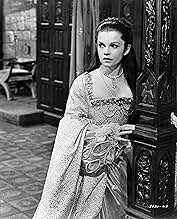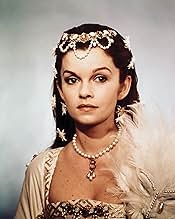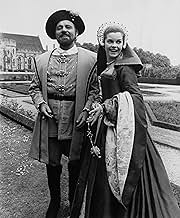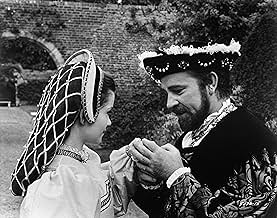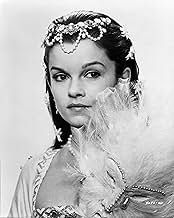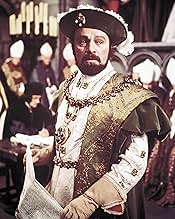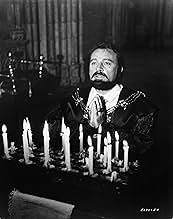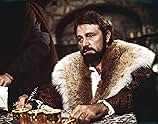King Henry VIII of England discards one wife, Catharine of Aragon, who has failed to produce a male heir, in favor of the young and beautiful Anne Boleyn.King Henry VIII of England discards one wife, Catharine of Aragon, who has failed to produce a male heir, in favor of the young and beautiful Anne Boleyn.King Henry VIII of England discards one wife, Catharine of Aragon, who has failed to produce a male heir, in favor of the young and beautiful Anne Boleyn.
- Won 1 Oscar
- 6 wins & 16 nominations total
- Anne Boleyn
- (as Genevieve Bujold)
Featured reviews
That's why his reign is just a darling for Hollywood. It has everything: obsession, love, lust, passion, hubris, politics, conspiracy, trials and many heads ending on the ballot. It's below-the-waist matters leading to the most pivotal episode of British history and producing one of its greatest monarchs Queen Elizabeth or as Pauline Kael put it "Anne's posthumous triumph". So, who needs books to learn about British monarchy history when you have Best Picture nominees (and occasional winners)? After having been inspired by Thomas More's integrity in "A Man of All Seasons", mesmerized by the rising charisma of "Elizabeth", now I feel like I almost completed my knowledge about Henry VIII's tumultuous reign with Charles Jarrott's "Anne of the Thousand Days", adapted from Maxwell Anderson's play. And I'm so proud to recognize some names like Norfolk or Cardinal Wosley (remarkably played by Anthony Quayle) And as Anne, Genevieve Bujold, is the perfect match for a Burtonesque character, a woman who can control the man who wants to control everything.
Anne is a young experienced girl, deprived of that virginity upon which the legend of her daughter would be built. She's lively and has a personality that throws sparkles all over the court. We first see her being lifted by her fiancé Lord Percy (Terence Wilton), she's in the air short enough so one head turns to her direction and notices her, it's the king. From that moment, he'll only have eyes for her. These three seconds are simply perfect and give that edge to cinema over the play where eye-language can't be perceptible. That look is the first brick to pave the road of a cultural revolution in Britain but it's handled in a rather trivial way. The Queen Catherine of Aragon, played in all matrimonial dignity by Irene Papas who specialized in roles of martyred wives, leaves the royal ball, the music stops but the King insists the show must go on. That scene find a powerful echo later in the film when Anne is the Queen and Henry starts having eyes on Jane Seymour, showing that the reign of Henry VII was all but a series of new beginnings.
The whole challenge of "Anne of the Thousand Days" is to make this transition from one Queen to another a riveting experience on both a human and political level, with Bujold's performance as a queen who wouldn't sell herself cheaply to a man who absolutely adores her is full of surprisingly unpredictable scenes. That Burton makes his King a little more accessible allows her to play 'hard to get', she has reasons to loathe him as she was prevented to marry her true love but on the other hand, she was advised not to give herself too easily for Henry would immediately renounce her. It is a slight possibility that she truly loved him and thus feigned indifference. And it is possible that Henry followed his courts' advisers to show his tender side. The film is a like a romantic game of hide-and-seek that hides graver diplomatic matters (with Spain and the Vatican) and one woman's personal ambition.
Anne wants to be the Queen and she promises sons if he can make her so and if he can't divorce Catherine, he'll use his power to cancel his wedding. It all can be summed up in Thomas More's warning to Norfolk "tell him what he ought to do, not what he's able to do". It's the most dangerous thing to tell a man such as Henry for what he can do because he'd realize sooner that he can do anything The catch is that Anne must fulfill her promise and if a king can make himself marry anyone, he can't control which chromosome he gives. The film is then a series of political machinery that all end up breaking on the wall of destiny: Henry can't have a male child, not one that can live after birth anyway. And divorce is like murder, one you do it once, the second time is no other and so.
The little weakness of the film is that we get from a passionate sequence between the two to Henry's immediate rejection of Anne after the second "failed birth" and so her demise seems rather abrupt, not as smooth as Thomas More's slow descent in disgrace in "A Man for All Seasons", but then-again Burton's performance redeems these flaws as he never really displays true hatred, he's just a man who wants to convince himself that he's doing the right thing. And Anne is not a heroine either, she has the blood of purer souls in her hands but it was worth having the future of England in her womb. The film is the collisions of two dangerous convictions: "I will have a son", "I will bear the future monarch of England", guess who was right?
Anne Boleyn, a high spirited young lass of 18, catches Henry VIII's eye at court. One of his previous dalliances was with her older sister Mary and that paid off well for the Boleyn family. Father Tom sees riches and glory even more and persuades her to really keep the king panting.
Anne succeeds all too well. Henry divorces Catherine of Aragon and marries Anne. But all he begats is another daughter. And Henry still wants a son and he's got an eye on another. It all ends tragically for the Boleyn family.
It's important to remember that as the film opens Henry VIII having caught sight of Anne at his court denies permission for her to marry some young lord whom she is in love with and vice versa. Had he looked elsewhere, had he moved on, all this might never have come to pass.
Anne of the Thousand Days took 21 years to come to the screen. It ran on Broadway for a year in 1948-1949 and starred Rex Harrison as Henry VIII. Richard Burton joins a great list of actors who've portrayed Henry VIII on the screen. Probably the young Charles Laughton did him best, but Burton is certainly fine.
Genevieve Bujold in her screen debut is a stunning and fetching Anne, too fetching for her own good. Poor kid though, in other than a monarchist society that was becoming more absolute during Henry's reign, she'd have married the man of her dreams and lived happily ever after.
Anthony Quayle is a fine Cardinal Woolsey though I prefer Orson Welles in A Man for All Seasons. Michael Hordern as Thomas Boleyn destroys more than one member of his family through his own ambition.
Irene Papas makes a tragic Catherine of Aragon. By all accounts Catherine was a pious woman who had incredible rotten luck with her pregnancies. Only daughter Mary survived who grew up to be the Queen known as Bloody Mary. She settled some accounts when she became Queen.
I think the best supporting portrayal is that of John Colicos as Thomas Cromwell. This Cromwell was the great uncle of the more well known Oliver Cromwell. Oliver has his supporters and detractors, but I've never seen a good word in any history books about Uncle Tom. Colicos has him pegged just right as a serpentine intriguer. By the way after the period of this film is over, Thomas Cromwell made one too many intrigues and got on Henry VIII's wrong side. People usually didn't live long after that and Cromwell was no exception.
When he wrote Anne of the Thousand Days, Maxwell Anderson grew up in a society of law. I think a fine appreciation of that fact comes into the moral of the story. Even an absolute monarch has to obey laws or no one is safe. Until Henry VIII was off this mortal coil, no one was.
Interesting screenplay based on the source stage play "Anne of the Thousand Days" by Maxwell Anderson that was originally produced on Broadway in New York at the Shubert Theatre, it describes "England between the years 1526 and 1536" . Dynamic performance by Richard Burton , though he hated both the film and his interpretation and was amazed when he received an Academy Award nomination for Best Actor . Burton had been the second actor to do so for playing Henry VIII, and the first to win for playing a role that someone else had already nominated an Oscar for playing the same character was actor Charles Laughton , he first played the monarch in 1933 for The private life of Henry VIII (1933) and won the Best Actor Academy Award for his performance . Burton and Genevieve Bujold make an extraordinary battle of wits , they were two of the foremost talents of the time . Actresses Olivia Hussey, Julie Christie , and Faye Dunaway all turned down the role of Anne Boleyn , Hussey was the first choice for the part but she declined due to personal problems she was dealing with at the time , as the leading female part in the end was cast with French actress Geneviève Bujold who gives a marvelous acting . Understanding and charismatic acting by large secondary cast as John Colicos as the ambitious Thomas Cromwell , Irene Papas as suffering Catherine of Spain , Michael Hordern as Thomas Boleyn , Peter Jeffreys as Duke of Norfork , among others . It appears uncredited Elizabeth Taylor as masked courtesan in a lush ball , in fact she wanted to play Anne Boleyn, but was rejected as too old at age 37 .
Sumptuous cinematography by Arthur Ibbetson , reflecting glamorously the spectacular sets and luxurious gowns which won an Academy Award . Evocative and emotive musical score by Georges Delerue . Lavishly produced by Hal B Wallis, fitting accurately to Renaissance time , though the film received mixed reviews, it was a financial flop on release . This engrossing motion picture was brilliantly directed by Charles Jarrot who continued in similar style with ¨Mary queen of Scots¨, about Henry's great-niece, he directed two years later and again a wills duel , this time starred by Glenda Jackson as Queen Elizabeth and Vanessa Redgrave as Mary Stuart .
Did you know
- TriviaDame Elizabeth Taylor was present at the shooting of the final Tower of London scene, out of fear that her husband, Richard Burton, and his co-star, Geneviève Bujold, were having an affair. Before she began filming the scene, a furious Bujold told director Charles Jarrott, "I'm going to give that bitch an acting lesson she'll never forget!"
- GoofsMary Tudor and her mother Catherine of Aragon are talking after Anne has become Queen. When Anne was Queen, Mary and her mother were forbidden to see each other.
- Quotes
King Henry VIII: You whore!
Anne: But Elizabeth was yours. Watch her as she grows; she's yours. She's a Tudor! Get yourself a son off of that sweet, pale girl if you can - and hope that it will live! But Elizabeth shall reign *after* you. Yes! Elizabeth - child of Anne the Whore and Henry the Blood-Stained Lecher - shall be Queen!
King Henry VIII: You've asked for death and you shall have it.
Anne: So be it. Only what I take to my grave, you take to yours. And think of this, Henry: Elizabeth shall be a greater Queen than any King of yours. She shall rule a greater England than you could ever have built! Yes - *my* Elizabeth shall be Queen. And my blood will have been well spent!
- ConnectionsFeatured in The World According to Smith & Jones: The Tudors (1987)
- SoundtracksGalliard
(uncredited)
Music by Anthony Holborne
- How long is Anne of the Thousand Days?Powered by Alexa
Details
- Release date
- Country of origin
- Language
- Also known as
- La reine aux mille jours
- Filming locations
- Penshurst Place, Penshurst, Kent, England, UK(Tudor garden)
- Production company
- See more company credits at IMDbPro
Box office
- Gross US & Canada
- $2,068,232
- Runtime2 hours 25 minutes
- Color
- Aspect ratio
- 2.35 : 1
Contribute to this page




